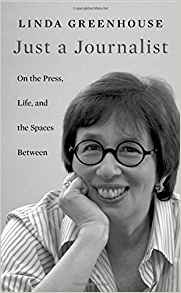 Linda Greenhouse, Just a Journalist; On the Press, Life, and the Spaces Between (Cambridge: Harvard University Press, 2017), 169pp.
Linda Greenhouse, Just a Journalist; On the Press, Life, and the Spaces Between (Cambridge: Harvard University Press, 2017), 169pp.
In our age of fake news, post-truth, and media like Breitbart that retail partisan viewpoints as neutral facts, what does it mean for journalists today to remain objective and neutral? By the time Linda Greenhouse retired in 2009, she had spent forty years at the New York Times thinking about these sorts of questions. For thirty years she covered the Supreme Court, for which work she won a Pulitzer Prize in 1998. In these autobiographical reflections, which began as a series of lectures at Harvard in 2015, she reflects on how journalistic ethics and responsibilities have changed in her life time.
In earlier generations, most everyone agreed that good journalism meant being "fair and balanced," of always presenting both sides of an issue. Strict impartiality was the ethical expectation and "holy grail" of the profession. Under no circumstances was a journalist allowed to express their personal opinion. Even the appearance of a conflict of interest was strictly forbidden. Leonard Downie, the "highly principled" managing editor of the Washington Post, even considered it unethical for a journalist to vote.
These old norms sound good, says Greenhouse, and she grew up as a journalist working under them, but she vigorously disagrees with them now, especially in our new political reality. Most people think that our president lies on a regular basis, but Greenhouse explains how shocking it was when the New York Times first called Trump a liar in print. And after all, this is a president who is proud to say that he has declared war on the media, which he considers "the opposition party," and "the Enemy of the American People." He has called political reporters "dishonest," "disgusting," "slime," "scum," and "the worst types of human beings on earth."
For Greenhouse, journalists should aim nor for detached objectivity but instead sound judgment that empowers readers and an informed citizenry. Waterboarding, in her view, is "torture" plain and simple, and not some benign euphemism like "enhanced interrogation." Journalists, she says, have a civic obligation to tell the truth, and can even become complicit when they don't. At least some stories don't have two equal sides (false equivalence). In her view, Daniel Okrent, the first "public editor" of the New York Times, gets it right: "The pursuit of balance can create imbalance because sometimes something is true."


